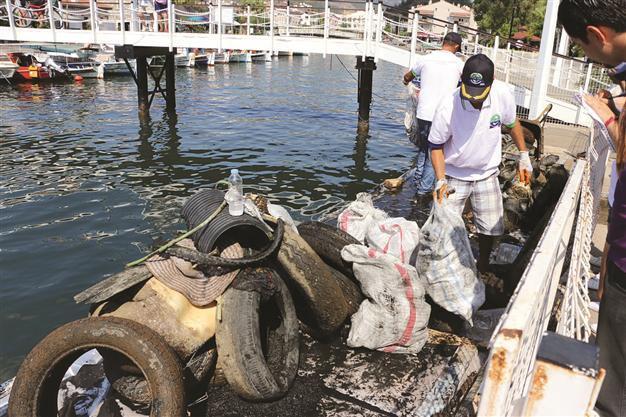Pollution in Marmara Sea at alarming levels, says association
ISTANBUL

Members of TURMEPA collect garbage from shores in the resort town of Marmaris in this file photo. The group offers awareness-raising training to children about sea pollution. AA Photo
Pollution in the Marmara Sea is risking the life of the fish and all people who eat them, and cleaning the sea will cost $5 billion, according to the head of the Turkish Marine Environment Protection Association (TURMEPA).
“Cleaning the Marmara Sea will cost $5 million. Cleaning a sea after it becomes dirty costs more [than cleaning it regularly]. The municipality should share a budget for it immediately,” TURMEPA Board chairman Tezcan Yaramancı told the Radikal website recently.
The Marmara region hosts 25 percent of Turkey’s total population and 60 percent of the country’s total industry.
Yaramancı said there were 127 different species of fish in the Marmara Sea in 1975, but this number has decreased to just five species today, citing pollution as the main factor.
In the past four decades, the population of the species of fish has decreased approximately 90 percent in the Marmara Sea, according to the Turkish Statistical Institute (TÜİK). The population of mackerel has decreased by 95 percent, the chub has decreased by 91 percent, the horse mackerel has decreased by 90 percent, the goat fish has decreased by 73 percent, and the blue fish has decreased 58 percent.
Meanwhile, samples taken from fish in the Marmara Sea indicated that carcinogenic heavy metals were found in 11 samples of the 30 total fish samples taken, according to Yaramancı, with mussels and anchovies containing mercury, cadmium and lead.
“The reasons for this pollution are clear," she said, citing the fact that almost half of all industrial factories in the region with more than 50 workers do not have any treatment facilities. According to Environment Ministry reports, 1,259 industrial business places out of the total 2,564 with more than 50 employees do not have any treatment facilities, according to the ministry.
Yaramancı said that even the firms that do have these facilities do not operate them, in order to decrease costs.
“Only 25 percent of wastewater receives treatment in the high technology biologic treatment centers in Istanbul. The remaining 75 percent receives only a preliminary treatment and flows into the Marmara Sea,” he said, citing figures provided by Istanbul’s Waterworks Authority (İSKİ).
Yaramancı called on the government to take urgent measures against environmental ruin in the Marmara Sea.
